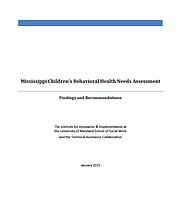Monday, June 19, 2017
A 2015 report, finally released to the public late last week, shows that the state over-relies on institutions to provide mental health-care to children in Mississippi. Attorney General Jim Hood's office previously denied public-records requests for the report. Photo by Imani Khayyam.
JACKSON — After nearly two years of litigation, U.S. District Judge Henry Wingate ordered the State of Mississippi to release a 2015 report on its system of mental-health care for children, referred to as the TAC report.
The report was a part of the State's commitment to work on its system of mental health care for children here after the U.S. Department of Justice began investigating it in 2011.
Parallel to that investigation, the Southern Poverty Law Center had sued Mississippi for its over-reliance on institutionalization in providing mental-health care for kids in 2010. That lawsuit is no longer a class-action suit, however, and the State released the report to The Clarion-Ledger's lawyers on June 17. The attorney general's office released the report to the Jackson Free Press.
The TAC report outlines several of the Mississippi's challenges in providing community-based mental-health care for children, from access to funding. As lawyers alleged in their 2010 lawsuit, the report confirms that Mississippi over-relies on institutional care for kids with behavioral or mental-health needs.
In fiscal-year 2014, the Division of Medicaid spent more than $184 million on children's and youth behavioral-health services, but 49 percent of that spending went toward institutional care. Nationally, the report says, in 2008, about 28 percent of a state's Medicaid division funds were spent on similar services. In other words, Mississippi continued to over-rely on institutions instead of following national trends and evidence-based research to use and invest in community-based services for kids' mental health.
"The lack of a fully developed and adequately funded community-based system has contributed to an over-reliance on institutional care for children and youth in Mississippi," researchers write.
Despite the Department of Justice beginning its investigation into the state's mental-health system of care in 2011, the TAC report shows that "spending for residential psychiatric treatment facilities and inpatient psychiatric hospitals increased by 11 percent and 6 percent, respectively from FY2010 to FY2014." As a result, more Mississippi children were sent to hospitals for care in those four years, an increase of 22 percent by 2014.
Mississippi faces several challenges with its mental-health system, some fixable and others that will likely take more time to repair. The report recommends that the State implement a system-wide review of data to evaluate the quality of services, and, in some cases, show how it is not collecting certain data at all.
"Data should not sit on a shelf," the report says. "Information should be made public and should be connected to quality improvement strategies and initiatives."
Family members as well as service providers told researchers that they were concerned with the quality of care provided to Mississippi's children.
"Family members and other stakeholders described barriers accessing needed services and supports, delays in obtaining necessary treatment leading to exacerbation in symptoms, lack of coordination among services, and ineffective care resulting in repeated hospitalizations or juvenile justice involvement," the TAC report says. "Families expressed that their opinions, beliefs, and values were not solicited or considered in the design and development of treatment interventions nor did they feel valued as partners in their child's care."
The State needs to develop and expand its community-based services, the report says, like the Wraparound Initiative, but Mississippi's rural nature as well as a lack of qualified health-care providers present unique challenges for leaders to address.
The report outlines several examples from states across the country that Mississippi can follow in order to improve its system of mental-health care for kids.
Email state reporter Arielle Dreher at [email protected] and follow her on Twitter at @arielle_amara.


